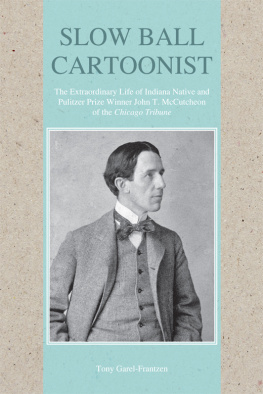Frantzen - Going nowhere, slow : the aesthetics and politics of depression
Here you can read online Frantzen - Going nowhere, slow : the aesthetics and politics of depression full text of the book (entire story) in english for free. Download pdf and epub, get meaning, cover and reviews about this ebook. year: 2019, publisher: Zero Books, genre: Romance novel. Description of the work, (preface) as well as reviews are available. Best literature library LitArk.com created for fans of good reading and offers a wide selection of genres:
Romance novel
Science fiction
Adventure
Detective
Science
History
Home and family
Prose
Art
Politics
Computer
Non-fiction
Religion
Business
Children
Humor
Choose a favorite category and find really read worthwhile books. Enjoy immersion in the world of imagination, feel the emotions of the characters or learn something new for yourself, make an fascinating discovery.

- Book:Going nowhere, slow : the aesthetics and politics of depression
- Author:
- Publisher:Zero Books
- Genre:
- Year:2019
- Rating:4 / 5
- Favourites:Add to favourites
- Your mark:
- 80
- 1
- 2
- 3
- 4
- 5
Going nowhere, slow : the aesthetics and politics of depression: summary, description and annotation
We offer to read an annotation, description, summary or preface (depends on what the author of the book "Going nowhere, slow : the aesthetics and politics of depression" wrote himself). If you haven't found the necessary information about the book — write in the comments, we will try to find it.
Frantzen: author's other books
Who wrote Going nowhere, slow : the aesthetics and politics of depression? Find out the surname, the name of the author of the book and a list of all author's works by series.
Going nowhere, slow : the aesthetics and politics of depression — read online for free the complete book (whole text) full work
Below is the text of the book, divided by pages. System saving the place of the last page read, allows you to conveniently read the book "Going nowhere, slow : the aesthetics and politics of depression" online for free, without having to search again every time where you left off. Put a bookmark, and you can go to the page where you finished reading at any time.
Font size:
Interval:
Bookmark:
Going Nowhere, Slow
In this sharp and poetic book, Mikkel Krause Frantzen brilliantly illustrates the horror of depression. But he doesnt leave us there, in despair, but opens up new hopeful ways of thinking about the spirit of our time.
Carl Cederstrm, author of The Happiness Fantasy, and co-author of Dead Man Working, The Wellness Syndrome, and Desperately Seeking Self-Improvement
Why are we all so depressed? Today, depression is less an individual malady, than it is a structure of feeling that pervades Western neoliberal society. In this book, Mikkel Krause Frantzen digs deeply into this situation, reading a number of works (novels, movies, visual art) that not only give expression to our depressive condition, but offer clues as to why and how we feel this way.
Steven Shaviro, author of The Cinematic Body, Connected, or What It Means to Live in the Network Society, The Universe of Things, and Discognition
In this groundbreaking book, Mikkel Krause Frantzen takes depression as something that does not simply have connection with the subjects past and alienation from others, but also to the idea of future and too much closeness. As a result, Frantzen finds in depression glimmers of optimism and hope. This book is essential reading for anyone who has questioned what depression is all about and why so many well-known novelists have created their best works trying to come to grips with it.
Renata Salecl, author of Tyranny of Choice, (Per) versions of love and hate, and On anxiety
Going Nowhere, Slow
The Aesthetics and Politics of Depression

First published by Zero Books, 2019
Zero Books is an imprint of John Hunt Publishing Ltd., No. 3 East St., Alresford,
Hampshire SO24 9EE, UK
www.johnhuntpublishing.com
www.zero-books.net
For distributor details and how to order please visit the Ordering section on our website.
Mikkel Krause Frantzen 2018
ISBN: 978 1 78904 214 6
978 1 78904 215 3 (ebook)
Library of Congress Control Number: 2018961090
All rights reserved. Except for brief quotations in critical articles or reviews, no part of this book may be reproduced in any manner without prior written permission from the publishers.
The rights of Mikkel Krause Frantzen as author have been asserted in accordance with the
Copyright, Designs and Patents Act 1988.
A CIP catalogue record for this book is available from the British Library.
Design: Stuart Davies
UK: Printed and bound by CPI Group (UK) Ltd, Croydon, CR0 4YY
US: Printed and bound by Thomson-Shore, 7300 West Joy Road, Dexter, MI 48130
We operate a distinctive and ethical publishing philosophy in all areas of our business, from our global network of authors to production and worldwide distribution.
Two absolutely quotidian questions somehow form the basis of the present work, which studies the psychopathology of depression in the Western world today, through the examination of four cultural works: the fiction of Michel Houellebecq, the fiction of David Foster Wallace, the installation and video works of the artistic duo who sign their collaborations under the name of Claire Fontaine, and finally Lars von Triers film Melancholia.
The first very simple question is the one that we, innocently, ask and answer every day: How are you? How is it going? Nowhere do we get a better description of the banality and brutality of this question than in the book Suicide (2008) by French author and artist douard Lev. In this book, which he handed over to his editor a couple of weeks before he took his own life in 2007, Lev conjures up the suicide of a depressed childhood friend 20 years earlier. The book is a work of fiction, written in the second person, as a continuous address to this childhood friend and an incessant reflection upon his life and death, though it is impossible not to read the book as some sort of self-portrait (which, incidentally, was the title of one of Levs previous books). In this book, the following scene appears:
One evening you were invited to dine at a friends house with other guests. To the host who, opening the door for you on your arrival, asked you how you were doing, you responded, Badly. [] You didnt want to disrupt the party, but you couldnt make yourself lie in response to the simple question, How are you doing? You were more honest than courteous. Even though you were capable of it, it seemed unthinkable to you to put on a show of well-being for a close friend. Having arrived in the living room, you did not want to reproduce the unease sparked by your first response. To your friends friends, some of whom you didnt know, you presented a friendly exterior. In this atmosphere, which made you feel foreign, you were surprised at your own success in putting on the appropriate face, which, if it didnt contribute to the general euphoria, at least didnt destroy the mood with its indifference.
This question how are you doing? is as banal as it is brutal, as predictable as it is profound. And in a situation like the one outlined in Levs book, it appears that it is imperative to lie, since to answer this question in earnest would involve breaking every possible code of conduct: Well, you see, not so well, I feel depressed, I cannot get up in the morning, my wife has just left me, my boss is an idiot, my life is meaningless etc. But most people do not do that, they prefer to keep the spirits high and the atmosphere nice and cozy. So, they lie, or, they just refrain from telling the truth, they say: I am fine, thank you very much. And how are you by the way?
The second question, equally banal, is: What time is it? What is the time? At a bar called Lygtens Kro in Copenhagen, a sign is hanging on the wall amidst old-fashioned ornaments and stall cigarette smoke. It says: The one who is happy does not notice that time goes by (in Danish: Den som er lykkelig lgger ikke mrke til at tiden gr). An unhappy person, a depressed person, on the other hand, is all too painfully aware of the passing of time. In this state seconds crawl forward, they drag themselves along. Following the course taken by the matter itself, I make the case in this book that the abortion of the future that occurs in depression entails that all that remains is a kind of eternal present full of pain and horror, and the feeling that this is all there is, always has been and always will be.
Its like horror more than sadness. Its more like horror, says the clinically depressed Kate Gompert in David Foster Wallaces Infinite Jest from 1996 . I cant stand feeling like this another second, and the seconds keep coming on and on. And in Michel Houellebecqs novels, especially in his debut novel Whatever from 1994, the depressed protagonists thus always know what time it is. It is 2 in the afternoon. It is 6.20. Here, time has become thoroughly explicit in the same way as Heidegger says that we only notice any given tool a hammer, for instance at that moment when it does not work anymore. In depression, time becomes elastic, it becomes explicit, then it snaps.
In this book Going Nowhere, Slow the Aesthetics and Politics of Depression, these two questions are inextricably linked. What time is it and how are you? These are the questions that every depressed person dislikes and fears. In fact, to the depressed person there is no difference between them; they remain one and the same. Also, these questions are not purely personal, psychological questions. They are also and perhaps above all deeply political questions. This book, intended as a diagnosis of the times, hinges upon these questions of time and effect. In other words: In order to answer the question
Font size:
Interval:
Bookmark:
Similar books «Going nowhere, slow : the aesthetics and politics of depression»
Look at similar books to Going nowhere, slow : the aesthetics and politics of depression. We have selected literature similar in name and meaning in the hope of providing readers with more options to find new, interesting, not yet read works.
Discussion, reviews of the book Going nowhere, slow : the aesthetics and politics of depression and just readers' own opinions. Leave your comments, write what you think about the work, its meaning or the main characters. Specify what exactly you liked and what you didn't like, and why you think so.











